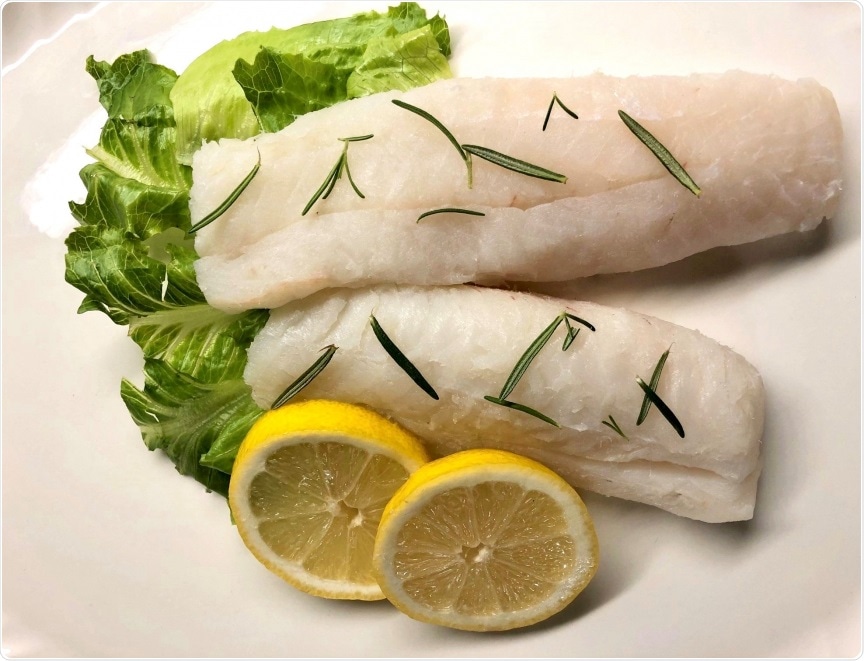According to a study performed by Rutgers University, companies looking to market seafood products produced from the cells of shellfish or fish must use the word “cell-based” on their product labels. This first-of-its-kind study was published in the Journal of Food Science.

A meal featuring white fish, which someday may be made from the cells of fish. Image Credit: William Hallman/Rutgers University–New Brunswick.
The U.S. Food and Drug Administration and the U.S. Department of Agriculture have stipulated that food products should include a “common or usual name” on their labels, so that people can make informed choices regarding what they are buying.
The research, conducted by William Hallman, a professor who chairs the Department of Human Ecology in the School of Environmental and Biological Sciences at Rutgers University–New Brunswick, is the first one to assess the type of name that should be used on the labels of seafood products to optimally fulfill regulatory as well as consumer acceptance criteria.
The results suggest that ‘cell-based’ is the best name when it comes to meeting both FDA regulations and likely consumer acceptance of these novel products. The participants were able to tell that ‘cell-based seafood’ products were different from ‘wild caught’ and ‘farm raised’ products, but viewed them as equally nutritious and were just as interested in tasting and purchasing them.”
William Hallman, Professor and Chair, Department of Human Ecology, School of Environmental and Biological Sciences, Rutgers University–New Brunswick
While the need for seafood products is constantly increasing, the global supply is susceptible and cannot match this demand. By creating only the parts of fish that are consumed by people instead of raising or catching them as whole, cell-based seafood products are anticipated to provide a sustainable and healthier option that will look, cook, and taste the same as traditional seafood.
Such products will also include the same health benefits and nutritional qualities as wild-caught and farm-raised seafood, but will be free of environmental contaminants, including microplastics and mercury.
As part of the Rutgers study, the researchers asked a total of 3,186 consumers to assess one of seven prospective names, and also evaluate “farm raised” and “wild caught,” displayed on images of realistic packages of shrimp, tuna, and salmon.
The names that were tested were “cell-cultured seafood,” “cell-based seafood,” “cultured seafood,” “cultivated seafood,” and the phrases were “grown directly from the cells of ___,” “cultivated from the cells of ___,” and “produced using cellular aquaculture.”
Under the regulations of FDA, a usual or common name should clearly differentiate a new type of product from those with which people are already familiar. In the case of cell-based seafood, this means selecting a name that alerts consumers that the product is different from farm-raised and wild-caught seafood.
Since the products will have the same kinds of proteins as those of traditional shellfish and fish, the name selected should also indicate that consumers allergic to seafood should not consume the product.
In addition, the research specified that the name should be perceived by consumers as a suitable term to detect the product and should not disparage either conventional or cell-based products, which excluded testing names, like “cruelty-free,” “lab-grown,” “slaughter-free,” and “synthetic.”
The researchers observed that terms that contain words like “cell,” such as “cell-cultured” and “cell-based,” worked most optimally in helping consumers infer that the products are neither wild-caught nor farm-raised.
Terms like “cell-cultured” and “cell-based” were not considerably different on a majority of the crucial measures, rendering “cell-cultured” also as a prospective viable term. Consumers perceived both terms as appropriate to detect the product and they did correspondingly well at signaling that individuals allergic to seafood should not consume the products.
But in the case of products containing “cell-based” labels, participants perceived them as equally desirable as “farm raised” and “wild caught” seafood products, while those containing “cell-cultured” labels were not. This indicates that “cell-based seafood” is the better usual or common term to appear on products.
Source:
Journal reference:
Hallman, W K & Hallman II, W K (2020) An empirical assessment of common or usual names to label cell-based seafood products. Journal of Food Science. doi.org/10.1111/1750-3841.15351.